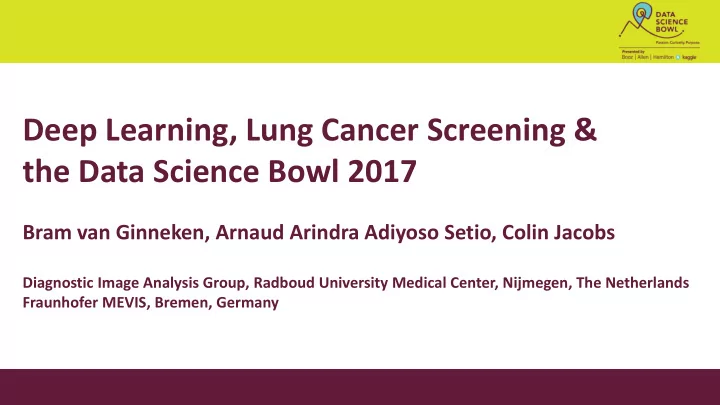

Deep Learning, Lung Cancer Screening & the Data Science Bowl 2017 Bram van Ginneken, Arnaud Arindra Adiyoso Setio, Colin Jacobs Diagnostic Image Analysis Group, Radboud University Medical Center, Nijmegen, The Netherlands Fraunhofer MEVIS, Bremen, Germany
Background and disclosures • 1996-2001: PhD Detection of tuberculosis in chest radiographs: CAD4TB now in use in >20 countries • 2004: Research on automated analysis of chest CT scans for lung cancer screening, with many partners in Europe, USA, Canada, Korea • 2010: Chair of Diagnostic Image Analysis Group, 40 researchers at Radboud University Medical Center, Nijmegen, The Netherlands; working for Fraunhofer MEVIS in Bremen, Germany • 2010: Developed software for automated reading of chest CT screening scans, available via Mevis Medical Solutions (Veolity) and InVivo (DynaCAD Lung) • 2014: Founder of Thirona • 2016: Involved in Data Science Bowl
Contents • Why should you do lung cancer screening with CT • Human reading of screening CT scans • Computer reading of screening CT scans • 2017 Data Science Bowl results
Lung cancer is the biggest cancer killer Lung cancer can grow unnoticed for years, because the lungs are very big organs When the patient goes to the doctor with complaints and lung cancer is diagnosed, the median size of the cancer is 4 cm, and usually it has already metastasized
Early detection is our only hope
Screening with CT • Hold your breath, slide through scanner in <10 seconds • High resolution (<1mm) 3D image of the lungs • Very low dose possible • No contrast material needed, very user friendly • No high-end scanner needed: cheap (~200 k$)
Baseline
After 1 year 6mm nodule
After 2 years 2cm nodule Squamous cell lung cancer Still early stage!
NLST led to screening implementation
Screening centers in the United States
Human reading of screening CT scans
Nodule malignancy calculator
Radiologists often don’t agree on nodules • Show table and images from LIDC study...
Some radiologists see many more nodules...
Radiologist often don’t agree on nodule type
What type of nodule is it? Complete agreement non-solid nodule Complete agreement solid nodule
What type of nodule is it? Complete disagreement part-solid nodule Complete disagreement part-solid nodule
Lung-RADS 4X
The Lung-RADS 4X category in practice
The Lung-RADS 4X category in practice
Computer reading of screening CT scans
2009: Finding nodules with computers 1 All together 0.9 Dayton 0.8 Pisa 0.7 Utrecht Torino 0.6 Sensitivity Bremen 0.5 Florianópolis 0.4 Bari 0.3 Hamburg 0.2 0.1 0 0.01 0.10 1.00 10.00 100.00 Average number of false alarms per scan
2017: Finding nodules with deep learning
www.grand-challenge.org
LUNA16: Nodule detection competition
LUNA16 leaderboard
Deep learning for nodule type classification Nature Scientific Reports 2017
Automatic segmentation May 2005: 640 mm 3 / 10.7mm; Jan 2010: 1042 mm 3 / 12.5mm; -490 HU, 326 mg -324 HU, 703 mg Case from the Danish Lung Cancer Screening Trial
Data Science Bowl 2017 Results
Data Science Bowl 2017 • Teams were provided with a single low dose CT scan from a lung cancer screening participant • Task: predict if this subject was diagnosed with lung cancer within one year of the CT scan • Approach of most teams: • Look for suspicious nodules • Estimate probability of malignancy for the most suspicious nodule(s)
ROC analysis Data Science Bowl test set 4B,4A,3,2 4B,4A,3 4B,4A Lung-RADS Non-cancer Cancer category cases cases 1 66 2 2 138 4 3 28 10 4B 4A 63 68 4B 54 67
ROC analysis Data Science Bowl test set 4B,4A,3,2 4B,4A,3 4B,4A Lung-RADS Non-cancer Cancer category cases cases 1 66 2 2 138 4 3 28 10 4B 4A 63 68 4B 54 67
ROC analysis Data Science Bowl test set 4B,4A,3,2 4B,4A,3 4B,4A 4B
ROC analysis Data Science Bowl test set 4B,4A,3,2 4B,4A,3 4B,4A 4B
Conclusions and future work • DSB 2017 provides very promising results • In lung cancer screening the vast majority of all scans are follow-up scans: estimating probability of lung cancer given a single CT scan is therefore not the most important and most relevant problem • Future competitions: • Estimate probability of lung cancer given multiple CT screening rounds • Extend the problem, taking into account clinical information • Add liquid biopsy results (blood tests), genetic tests, etc • Predict 5-year probability of lung cancer: personalized screening intervals
Recommend
More recommend